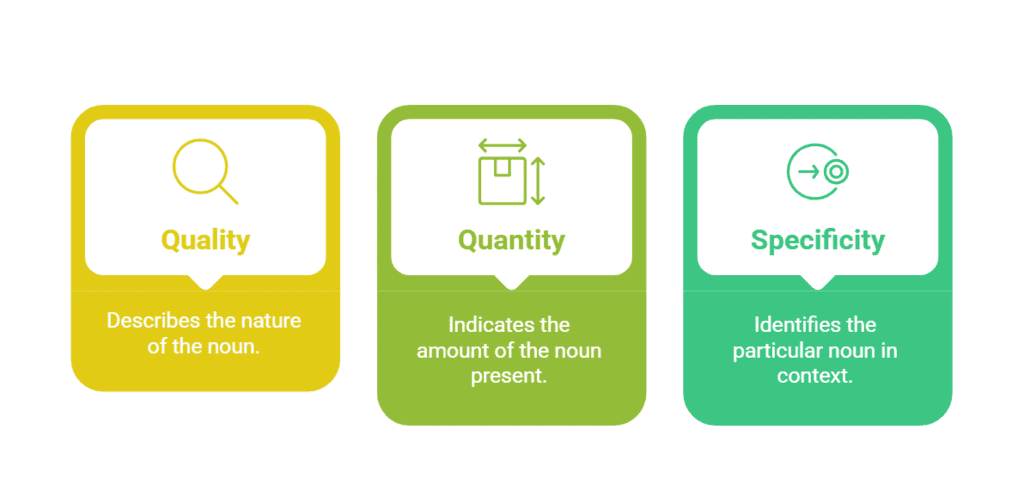Adjective - 1 | English Grammar Basic - Class 10 PDF Download
What is an Adjective?
- An adjective is a word that describes or gives more information about a noun.
- For example, in the sentence "Harish is a clever boy," the word "clever" is an adjective because it tells us what kind of boy Harish is.
- Adjectives can show different qualities, quantities, or specific details about nouns.
Adjectives can provide information about:
- Quality: What kind of noun it is.
- Quantity: How much of the noun there is.
- Specificity: Which particular noun is being referred to.
 Examples:
Examples: - "I do not like that girl." Here, "that" points out which girl is meant.
- "He gave me ten oranges." In this case, "ten" shows how many oranges he gave.
- "There is enough time for departure." Here, "enough" indicates how much time is available for departure.
Kinds of Adjectives
Adjectives can be classified into various kinds based on the information they convey about nouns. Here are the different kinds of adjectives:
Adjectives of Quality: These adjectives describe the quality or kind of a person or thing.
For example:
- "The Ganges is the holy river."
- "Kolkata is a large city."
- "He is an honest man."
Adjectives of Quantity: These adjectives indicate how much of a thing is meant.
Examples include:
- "He drank much milk."
- "I want some paper."
- "I drank a little milk."
- "It did not cause any pain."
- "Jones got the whole property."
Adjectives of Number: These adjectives show how many are meant or in what order.
For example:
- Definite Numerals: "four," "fourth," "nine," "ninth," etc.
- Indefinite Numerals: "all," "few," "many," "some," etc.
- Cardinals: Show how many, e.g., "one," "two," "three."
- Ordinals: Show order, e.g., "first," "second," "third."
Demonstrative Adjectives: These adjectives point out which person or thing is meant.
For example:
- "This book is mine."
- "That book is yours."
- "These trees are tall."
- "Those trees are short."
Distributive Adjectives: These adjectives indicate that persons or things are taken separately.
Examples include:
- "Each," "Every," "Either," and "Neither."
Emphasizing Adjectives: These adjectives are used to emphasize a particular quality or characteristic.
For example:
- "He is a very tall man." (emphasizing "tall")
Interrogative Adjectives: These adjectives are used to ask questions about a noun.
For example:
- "Which book do you want?"
- "What color do you prefer?"
Possessive Adjectives: These adjectives show ownership or possession.
For example:
- "My car is parked outside."
- "Their house is beautiful."
Proper Adjectives: These adjectives are derived from proper nouns and indicate a specific quality.
For example:
- "Indian cuisine is famous worldwide."
- "French wines are renowned."
Relative Adjectives: These adjectives are used to provide more information about a noun in a relative clause.
For example:
- "The book that I borrowed is interesting."
- "The house where I grew up is now for sale."
Exclamatory Adjectives: These adjectives express strong emotions or feelings about a noun.
For example:
- "What a beautiful sunset!"
- "How incredible this performance is!"
|
20 videos|143 docs|18 tests
|
FAQs on Adjective - 1 - English Grammar Basic - Class 10
| 1. What are some common adjectives in the English language? |  |
| 2. How do adjectives modify nouns in a sentence? |  |
| 3. Can adjectives have different forms for comparative and superlative degrees? |  |
| 4. What is the difference between attributive and predicative adjectives? |  |
| 5. How can adjectives be used to create vivid descriptions in writing? |  |






















